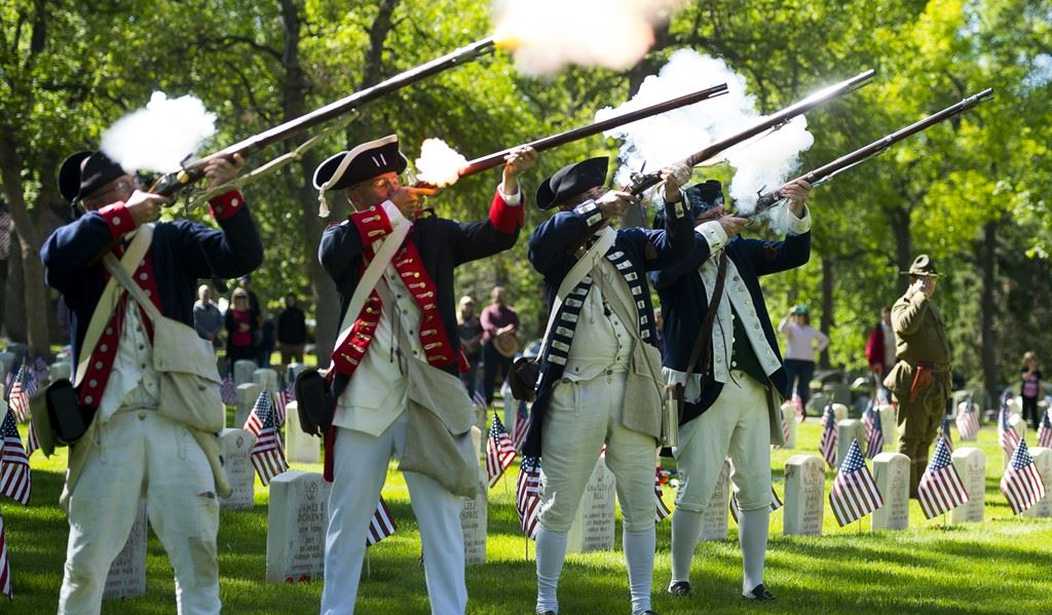On April 19, 1775, a few shots fired in the Massachusetts towns of Lexington and Concord shook the foundations of the world and heralded the dawn of a new age.
When a few brave minutemen — including at least one slave, Peter Salem — stood their ground on Lexington Green and Concord’s North Bridge and refused to let the British soldiers pass, it must have seemed to the prudent and the fearful like an act of insane futility. How were rag-tag groups of farmers and shopkeepers to defeat the most powerful and best-trained army in the world? And yet the American patriots drove the British back to Boston in shame. There was a long war ahead of the rebels, but they had proved that they were willing to die to defend their freedoms against the ever more tyrannical British Empire. History.com provides more details on these key Battles of Lexington and Concord.
Through all the vicissitudes of war, with only a minority of the colonies’ population actively supporting them (and another strong minority actively opposing them), the American Revolutionaries endured death, disease, injury, and deprivation to prove that “all men are created equal, that they are endowed by their Creator with certain unalienable Rights, that among these are Life, Liberty, and the pursuit of Happiness.”
The famous phrase so often associated with the opening salvos at Lexington and Concord, “the shot heard round the world,” is said to have originated in Ralph Waldo Emerson’s Concord Hymn. The Hymn was sung at the completion of the Concord Battle Monument on July 4, 1837, only a little over 60 years after the fateful events of April 19, 1775. Below is the text of Emerson’s Hymn. It is a short and simple but moving tribute to the heroes of Lexington and Concord, and expresses the hope that the Battle Monument will long serve as a reminder of our Revolutionary forebears’ courage:
By the rude bridge that arched the flood,
Their flag to April’s breeze unfurled,
Here once the embattled farmers stood
And fired the shot heard round the world.The foe long since in silence slept;
Alike the conqueror silent sleeps;
And Time the ruined bridge has swept
Down the dark stream which seaward creeps.On this green bank, by this soft stream,
We set today a votive stone;
That memory may their deed redeem,
When, like our sires, our sons are gone.Spirit, that made those heroes dare
To die, and leave their children free,
Bid Time and Nature gently spare
The shaft we raise to them and thee.
Related: How George Washington Celebrated St. Paddy’s Day at Valley Forge
Another American poet who beautifully memorialized the heroics at Lexington and Concord was the great Henry Wadsworth Longfellow. In his poem “Paul Revere’s Ride,” Longfellow not only described Revere’s fateful ride to warn the colonists that the British were coming to seize their arms (it turns out tyrants always enforce gun control) but also the battles that followed.
You know the rest. In the books you have read,
How the British Regulars fired and fled,—
How the farmers gave them ball for ball,
From behind each fence and farmyard-wall,
Chasing the red-coats down the lane,
Then crossing the fields to emerge again
Under the trees at the turn of the road,
And only pausing to fire and load.
Longfellow ended his immortal poem with an expression of his belief that American patriots will always heed the warning that tyranny is about to strike at American freedoms. It is a stirring reminder that, as Ronald Reagan said, “Freedom is a fragile thing and it’s never more than one generation away from extinction.” We have a new battle for liberty in our own times, not perhaps with guns, but a war nonetheless.
So through the night rode Paul Revere;
And so through the night went his cry of alarm
To every Middlesex village and farm,—
A cry of defiance, and not of fear,
A voice in the darkness, a knock at the door,
And a word that shall echo forevermore!
For, borne on the night-wind of the Past,
Through all our history, to the last,
In the hour of darkness and peril and need,
The people will waken and listen to hear
The hurrying hoof-beats of that steed,
And the midnight message of Paul Revere









Join the conversation as a VIP Member